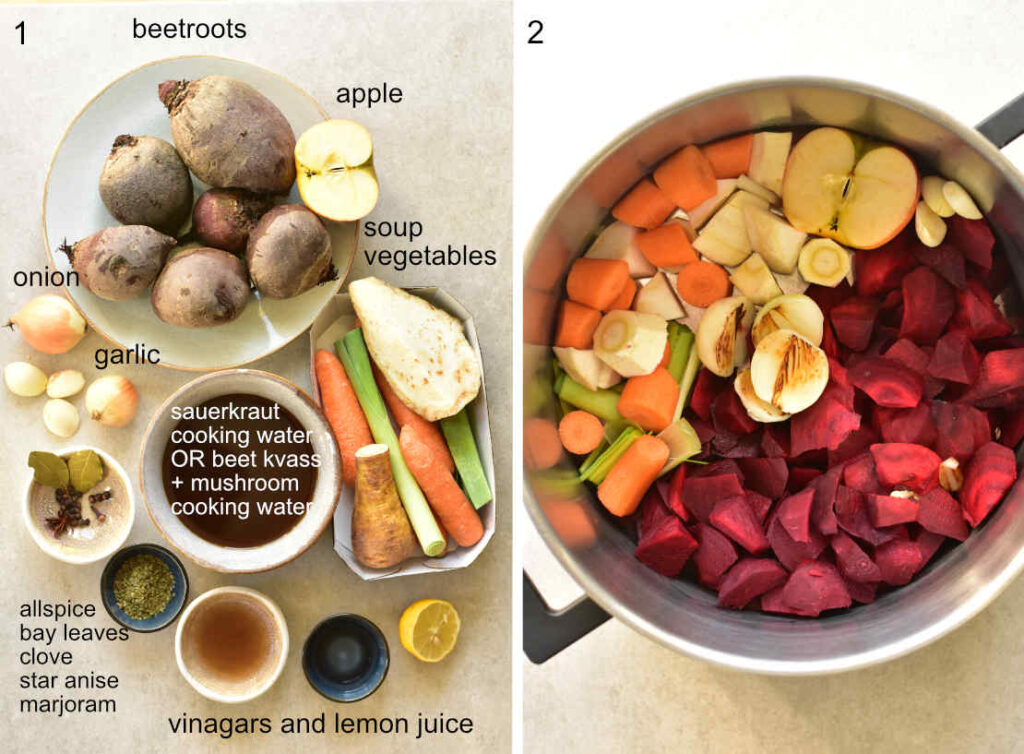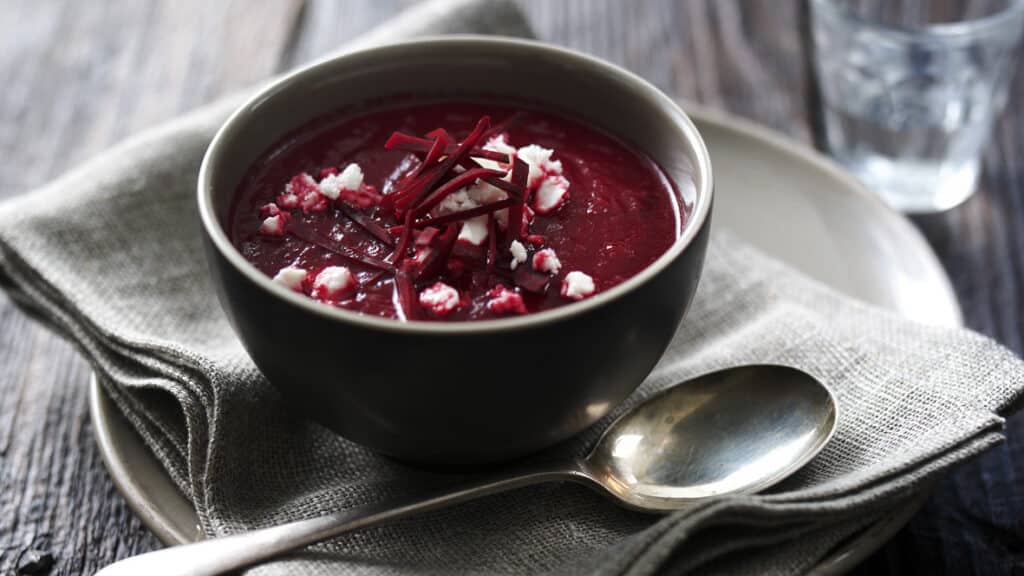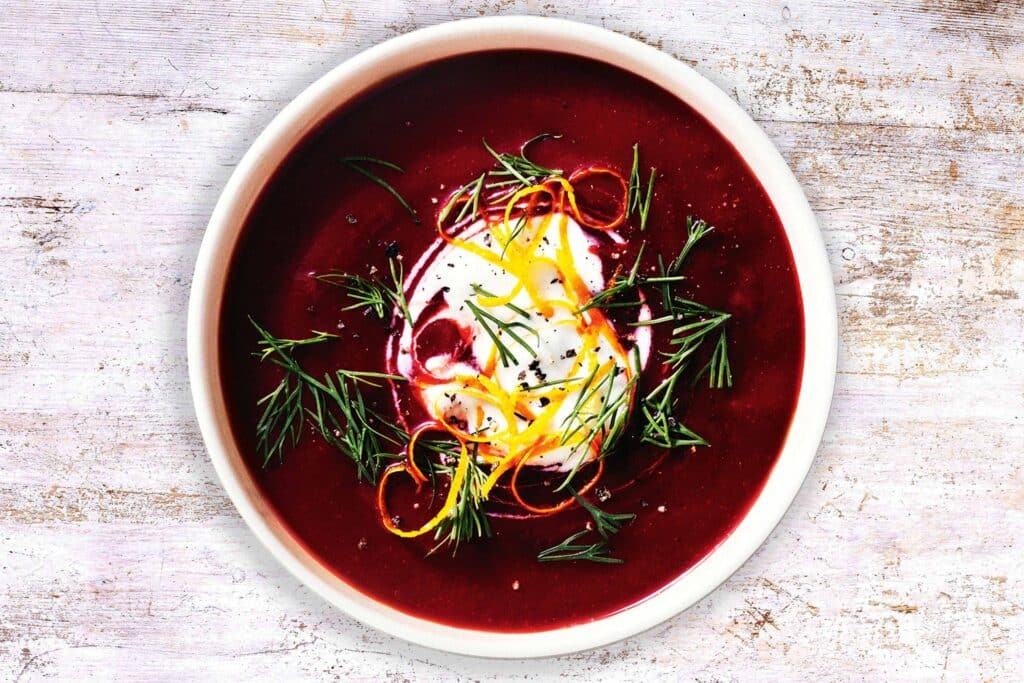As we lift the ladle to explore the world of beetroot soup recipes, we uncover a bowl of nourishment and history woven into the fabric of cultures around the globe. From Eastern European borscht to Asian variations, this humble root vegetable transforms into a symphony of taste and tradition.
“Delving into the rich tapestry of culinary traditions, few dishes capture the essence of comfort and nourishment quite like beetroot soup.
This vibrant concoction, often adorned with hues ranging from deep ruby to earthy maroon, beckons with its enchanting colour and promises a journey through flavours that dance between sweet and earthy, delicate and robust.

Join us as we peel back the layers of beetroot soup’s heritage, preparation, and its undeniable place at the intersection of health and indulgence.”
Read Also: Peanut Butter Whiskey: A Comprehensive Review
What is Beetroot Soup Good for?
Beetroot soup, often referred to as borscht in many Eastern European cuisines, is not only a flavorful and comforting dish but also offers several potential health benefits:

- Rich in Nutrients: Beetroot is a nutrient-dense vegetable that’s packed with vitamins, minerals, and antioxidants like vitamin C, potassium, and folate. These nutrients play essential roles in maintaining overall health.
- Heart Health: The nitrates present in beetroot have been linked to improved cardiovascular health. Nitrates are converted into nitric oxide in the body, which helps relax blood vessels, leading to better blood flow, reduced blood pressure, and potentially lower risk of heart disease.
- Anti-Inflammatory Properties: Beetroot contains betalains, which are pigments with anti-inflammatory and antioxidant properties. These compounds may help reduce oxidative stress and inflammation in the body.
- Digestive Health: The fibre content in beetroot can contribute to healthy digestion and regular bowel movements. Fibre also supports gut health by promoting the growth of beneficial gut bacteria.
- Detoxification: Betaine, a compound found in beetroot, supports the liver’s natural detoxification processes. It helps the liver process toxins and waste products, potentially aiding in overall detoxification.
- Athletic Performance: Some studies suggest that the nitrates in beetroot can enhance exercise performance by improving oxygen delivery to muscles, thus increasing endurance and reducing fatigue.
- Brain Health: The nitrates and antioxidants in beetroot may also have positive effects on cognitive function and brain health, as they support healthy blood flow to the brain.
- Cancer Prevention: The betalains and other antioxidants in beetroot have shown potential in reducing oxidative stress and inflammation, which are factors associated with the development of certain types of cancer.
- Weight Management: Beetroot is relatively low in calories and contains fibre, which can help you feel full and satisfied, potentially aiding in weight management efforts.
- Skin Health: Antioxidants in beetroot, such as vitamin C and beta-carotene, support skin health by combating free radicals that contribute to premature ageing and skin damage.
- Iron Source: Beetroot contains moderate iron, which is important for maintaining healthy blood and preventing iron deficiency anaemia.
It’s important to note that while beetroot soup can offer these potential health benefits, individual responses to foods can vary. Additionally, the overall nutritional profile of beetroot soup can depend on its preparation and ingredients.
As with any dietary choice, moderation and balance are key, and it’s always a good idea to consult with a healthcare professional or registered dietitian before making significant changes to your diet.
Read Also: Vegan Tacos Recipe
What is Another Name for Beetroot Soup?
Another name for beetroot soup is “borscht.” Borscht is a traditional Eastern European soup that is made primarily from beets and often includes other ingredients such as vegetables, meat, and sour cream.
The name “borscht” is commonly associated with the soup in countries like Russia, Ukraine, Poland, and other parts of Eastern Europe. It’s a versatile dish that can vary in ingredients and preparation methods across different regions and cultures.
What are the Benefits of Tomato, Carrot and Beetroot Soup?
Tomato, carrot, and beetroot soup, often referred to as a “triple-threat” soup due to its combination of three nutrient-rich vegetables, offers a variety of health benefits:

- Vitamins and Minerals: This soup is a great source of essential vitamins and minerals. Tomatoes provide vitamin C, potassium, and lycopene—an antioxidant known for its potential to reduce the risk of chronic diseases.
- Carrots contribute vitamin A in the form of beta-carotene, which is important for eye health and immune function. Beetroot adds folate, manganese, and additional antioxidants.
- Antioxidant Power: The combination of tomatoes, carrots, and beetroot provides a powerful dose of antioxidants, which help protect cells from damage caused by free radicals. Antioxidants play a role in reducing the risk of chronic diseases and supporting overall well-being.
- Heart Health: Tomatoes contain lycopene, which has been associated with improved cardiovascular health by helping to lower blood pressure, reduce cholesterol levels, and support healthy blood vessels. Potassium in tomatoes and carrots can also aid in maintaining healthy blood pressure.
- Digestive Health: Carrots are rich in dietary fibre, which promotes healthy digestion and can help prevent constipation. Fibre also supports gut health by feeding beneficial gut bacteria.
- Detoxification: Beetroot contains betalains, compounds that support the body’s natural detoxification processes by assisting the liver in eliminating toxins and waste.
- Eye Health: Carrots are renowned for their beta-carotene content, a precursor to vitamin A essential for maintaining good vision and eye health.
- Skin Benefits: The vitamins and antioxidants in this soup, particularly beta-carotene from carrots and vitamin C from tomatoes, promote healthy skin by protecting it from damage and supporting collagen production.
- Weight Management: This soup is generally low in calories and high in fibre, making it a filling and satisfying option for those looking to manage their weight.
- Hydration: The high water content of tomatoes and other vegetables in the soup contributes to hydration, which is essential for overall bodily functions.
- Cancer Prevention: The antioxidants and bioactive compounds in tomatoes, carrots, and beetroot have shown potential in reducing the risk of certain types of cancer, including prostate, lung, and stomach cancers.
- Immune Support: Vitamin C from tomatoes and other nutrients in the soup can contribute to a stronger immune system, helping your body fend off infections and illnesses.
- Overall Nutrient Intake: Consuming a variety of vegetables through this soup provides a well-rounded range of nutrients that contribute to overall health and well-being.
It’s important to keep in mind that the specific nutritional content and benefits of the soup can vary based on preparation methods and ingredient ratios. Including a diverse range of vegetables and consuming them in different forms, such as soups, can be an excellent way to reap their combined benefits.
As always, individual dietary needs and health considerations should be taken into account, and consulting a healthcare professional or registered dietitian is recommended.
See Also: 20 Healthy Smoothie Recipes for a Delicious and Energizing Breakfast”
Beetroot Soup Recipe
Here’s a simple recipe for beetroot soup (borscht):
Ingredients:
- 3 medium-sized beets, peeled and grated
- 2 medium-sized carrots, peeled and grated
- 1 onion, finely chopped
- 3 cloves of garlic, minced
- 4 cups vegetable or chicken broth
- 2 cups diced tomatoes (canned or fresh)
- 2 medium-sized potatoes, peeled and diced
- 1 bay leaf
- 1 teaspoon dried thyme or dill (or fresh if available)
- Salt and pepper to taste
- Sour cream or plain yoghurt (for serving)
- Chopped fresh herbs (such as dill or parsley) for garnish
Instructions:
- Heat a bit of oil in a large soup pot over medium heat. Add the chopped onion and cook until it becomes translucent.
- Add the minced garlic and grated beets. Sauté for about 5-7 minutes until the beets start to soften and release their colour.
- Add the grated carrots and diced tomatoes to the pot. Continue to cook for another 5 minutes.
- Pour in the vegetable or chicken broth and add the diced potatoes, bay leaf, and dried thyme or dill. Bring the soup to a boil.
- Once boiling, reduce the heat to a simmer and cover the pot. Let the soup simmer for about 20-25 minutes or until the vegetables are tender.
- Remove the bay leaf from the soup. Use an immersion or regular blender to puree the soup until smooth. If using a regular blender, be sure to blend in batches and allow the soup to cool slightly before blending.
- Return the pureed soup to the pot and heat it gently. Season with salt and pepper to taste.
- Serve the soup hot, garnished with a dollop of sour cream or plain yoghurt and chopped fresh herbs like dill or parsley.
This recipe yields a delicious and vibrant beetroot soup that’s both nutritious and comforting. Feel free to adjust the seasonings and ingredients to your taste preferences. You can also add additional vegetables, herbs, or even a touch of lemon juice for extra flavour. Enjoy your homemade beetroot soup.
Serving Variations
Here are some serving variations and accompaniments you can consider to enhance your beetroot soup experience:
- Sour Cream Swirl: Serve each bowl of beetroot soup with a swirl of tangy sour cream or Greek yoghurt on top. This adds creaminess and balances the flavours of the soup.
- Fresh Herbs: Garnish your soup with a handful of chopped fresh herbs such as dill, parsley, or chives. Not only do these herbs add a burst of flavour, but they also provide a pop of colour.
- Croutons: Top your soup with homemade or store-bought croutons for added texture and crunch. You can make croutons from whole-grain bread for a healthier option.
- Toasted Nuts: Sprinkle toasted nuts like almonds or walnuts over the soup for a nutty flavour and additional crunch.
- Citrus Zest: A touch of citrus zest, such as lemon or orange zest, can provide a refreshing contrast to the earthy flavours of the soup.
- Feta Cheese: Crumble some feta cheese over the soup for a salty and tangy element that complements the sweetness of the beets.
- Hard-Boiled Eggs: Top each bowl with slices of hard-boiled egg. The creamy yolk and egg whites add both protein and richness to the soup.
- Smoked Fish: For a more substantial option, consider adding flakes of smoked fish, such as salmon or trout, to the soup. This creates a delightful flavour combination.
- Caramelized Onions: Sauté thinly sliced onions until they caramelize and become sweet and golden brown. Sprinkle them on top of the soup for extra depth of flavour.
- Crème Fraîche: Similar to sour cream, crème fraîche adds a luxurious touch to the soup with its creamy and slightly tangy taste.
- Spices: Experiment with adding a pinch of spices like cumin, coriander, or paprika to the soup for an extra layer of flavour complexity.
- Seeds: Garnish with seeds like pumpkin seeds (pepitas) or sunflower seeds for a nutritious crunch.
Remember, these serving variations are flexible, and you can mix and match them to create a combination that suits your taste preferences. The goal is to enhance the flavours and textures of the beetroot soup while adding visual appeal. Enjoy your creatively garnished and delicious bowl of soup.
Read Also: Creamy Peppercorn Sauce Recipe With Steak
How to Store Beetroot Soup
Storing beetroot soup properly is essential to maintain its freshness and flavour. Here’s how you can store beetroot soup:
Refrigeration
- Allow the soup to cool down to room temperature before storing it in the refrigerator. Hot soup can raise the temperature inside the fridge and affect the overall temperature of the contents.
- Once the soup has cooled, transfer it to an airtight container. Glass, plastic, or BPA-free containers with secure lids work well.
- Leave some space at the top of the container to allow for expansion as the soup cools and freezes.
- Label the container with the date you prepared the soup. Most homemade soups can be safely stored in the refrigerator for 3 to 4 days.
Freezing
- If you plan to store the soup for an extended period, consider freezing it. Freezing helps preserve the soup’s quality for a longer time.
- Allow the soup to cool completely in the refrigerator before transferring it to freezer-safe containers or resealable plastic freezer bags.
- Leave some space at the top for containers to accommodate expansion during freezing. If using plastic bags, remove as much air as possible before sealing.
- Label the containers or bags with the date to keep track of how long the soup has been frozen.
- Frozen beetroot soup can be stored for about 2 to 3 months. However, try to consume it within the first month for optimal quality.
Read Also: Easy Steak Tips and Recipes
Thawing and Reheating
- To thaw frozen beetroot soup, transfer it from the freezer to the refrigerator and allow it to thaw slowly. This will help maintain the soup’s texture and flavour.
- Once thawed, reheat the soup on the stovetop over medium-low heat. Stir occasionally to ensure even heating.
- You can also reheat individual portions in the microwave, stirring every 1-2 minutes until heated through.
- Avoid bringing the soup to a rolling boil during reheating, as this can affect the texture and flavour.
- Check the soup’s temperature before consuming it to ensure it’s heated to your desired level.
Remember that while freezing helps preserve the soup, it may alter the texture slightly. The soup might separate upon reheating, but stirring it gently will usually help it regain its original consistency.
Always use proper food safety practices when storing and reheating foods. If the soup smells or looks off or if you’re unsure about its safety, it’s best to discard it to avoid any potential foodborne illnesses.
Beetroot soup stands as a testament to the harmonious marriage of flavours, cultures, and health benefits. With its rich hue and robust taste, this soup warms our hearts and nourishes our bodies in ways that resonate through history and modern wellness practices.
From the earthy sweetness of beets to the vibrant tang of tomatoes and the comforting familiarity of carrots, each ingredient contributes a unique facet to the culinary gem that is beetroot soup.
As we savour each spoonful, we embrace a journey through time and tradition, from the iconic borscht of Eastern Europe to innovative adaptations that span the globe.
This vibrant elixir offers a symphony of nutrients, antioxidants, and fibres that promote heart health, support digestion, bolster the immune system, and invigorate our overall well-being.
See Also: Tiffin Recipe: Discover the Secrets of Superb Cooking
FAQs for Beetroot Soup Recipe
What are the benefits of drinking carrot, beetroot and tomato juice daily?
Carrots, beetroots and tomatoes are rich in antioxidants and thus free our body from toxins and free radicals and purify our blood. They help detox and cleanse our body internally.
What happens if we drink carrot and beetroot juice every morning?
Both carrots and beetroot have natural detoxifying properties that support liver function and help eliminate toxins from the body.
What is the best time to drink beetroot and carrot juice benefits?
Morning – Carrot beetroot juice contains a high amount of essential bioactive compounds, making it an excellent morning drink to kick-start your day. It has beneficial properties necessary for our daily functioning.
What is the best time to drink beetroot and carrot juice in the evening?
Drink this healthy juice every morning on an empty stomach, an hour before your breakfast, to get the most out of this healthy drink. Repeat in the evening before dinner.
